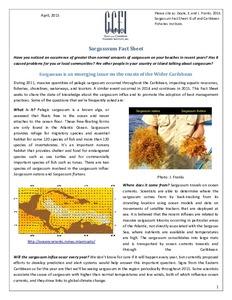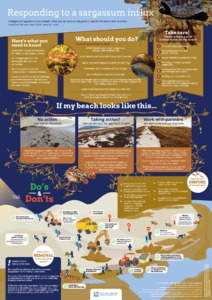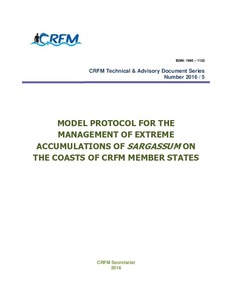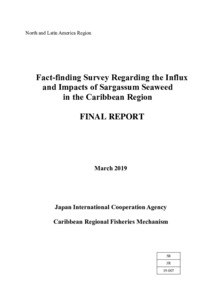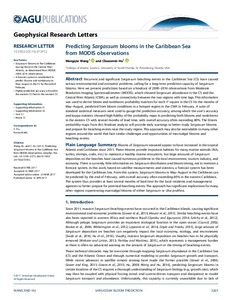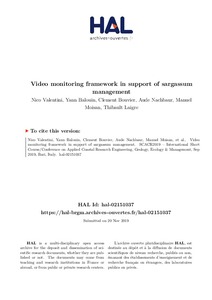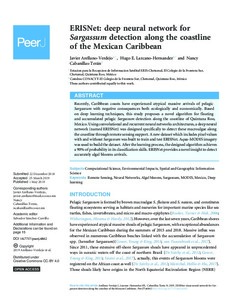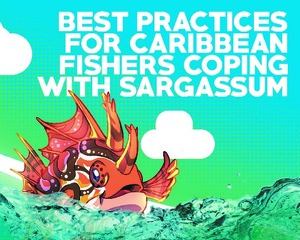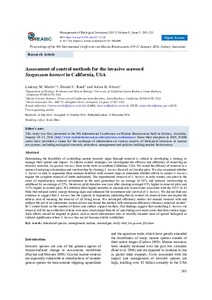Search
Now showing items 1-10 of 11
Sargassum Fact Sheet.
(Gulf and Caribbean Fisheries Institute., Marathon, FL, 2015)
During 2011, massive quantities of pelagic sargassum occurred throughout the Caribbean, impacting aquatic resources,
fisheries, shorelines, waterways, and tourism. A similar event occurred in 2014 and continues in 2015. ...
Responding to a sargassum influx. [poster]
(Gulf and Caribbean Fisheries Institute., Marathon, FL, 2018)
If sargassum appears on your beach, what you do next can be good or bad for the beach and business. Important lessons have been learned.
Model Protocol for the Management of Extreme Accumulations of Sargassum on the Coasts of CRFM Member States.
(Caribbean Regional Fisheries Mechanism, Belize, 2016)
The 26th Meeting of the CRFM Executive Committee noted the protocol developed for the
management of extreme accumulations of Sargassum in Puerto Rico and considered the efficacy
of such a protocol being considered for ...
Fact-finding Survey Regarding the Influx and Impacts of Sargassum Seaweed in the Caribbean Region: final report.
(Caribbean Regional Fisheries Mechanism and Japan International Cooperation Agency, Belize, 2019)
The Caribbean region has suffered a sudden increase in the influx of Sargassum seaweed since 2011, and
several countries in the region have requested support to the Government of Japan and the Japan
International Cooperation ...
Predicting Sargassum blooms in the Caribbean Sea from MODIS observations.
(2017)
Recurrent and significant Sargassum beaching events in the Caribbean Sea (CS) have caused
serious environmental and economic problems, calling for a long-term prediction capacity of Sargassum
blooms. Here we present ...
Video monitoring framework in support of sargassum management,
(2019)
The waters off Caribbean islands have seen large amounts of Sargassum seaweed during the last
years (Wang and Hu, 2016). This record-breaking events of algae blooms and mass stranding started
in earnest in 2011, then ...
ERISNet: deep neural network for Sargassum detection along the coastline of the Mexican Caribbean.
(2019)
Recently, Caribbean coasts have experienced atypical massive arrivals of pelagic
Sargassum with negative consequences both ecologically and economically. Based
on deep learning techniques, this study proposes a novel ...
Golden Tides: Management Best Practices for Influxes of Sargassum in the Caribbean with a Focus on Clean-up.
(Centre for Resource Management and Environmental Studies (CERMES), The University of the West Indies, Cave Hill Campus, Barbados, 2016)
The purpose of this management brief is to enable government officials, coastal managers,
beach caretakers and coastal residents to get ahead of the “golden tides” by providing up-to-date
information on the recent ...
Best practices for Caribbean Fishers coping with Sargassum.
(Centre for Resource Management and Environmental Studies (CERMES), The University of the West Indies, Cave Hill Campus, Cave Hill, Barbados, 2019)
What is Sargassum?
Assessment of control methods for the invasive seaweed Sargassum horneri in California, USA.
(2017)
Determining the feasibility of controlling marine invasive algae through removal is critical to developing a strategy to manage their spread and impact. To inform control strategies, we investigated the efficacy and ...
 Repository of community practices in Ocean Research, Applications and Data/Information Management
Repository of community practices in Ocean Research, Applications and Data/Information Management
